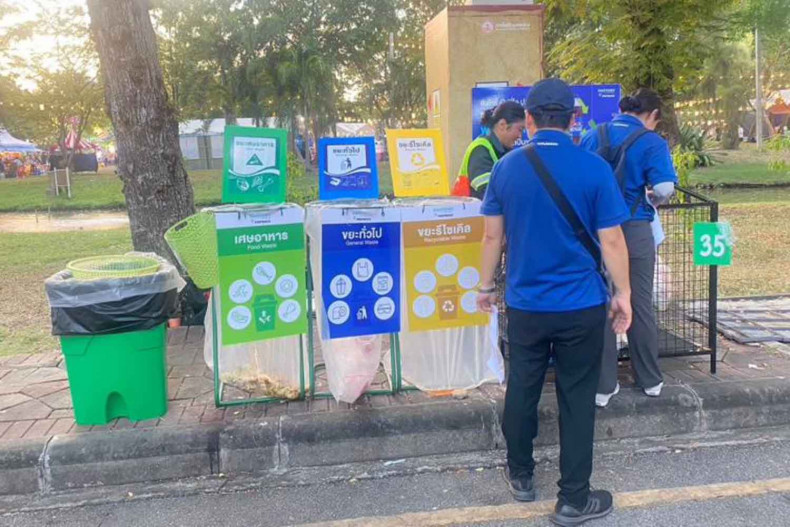The Bangkok Metropolitan Administration (BMA) is urging residents to begin sorting their trash before the new waste collection policy takes effect on 1/10.
Under the new policy, residents are required to sort their waste into four categories: food scraps, recyclables, general waste, and hazardous waste. Daily household waste should not exceed 20 liters or 4 kg.
 |
Residents sorting trash in Bangkok. Photo: BMA |
Residents sorting trash in Bangkok. Photo: BMA
Households that sort their waste correctly and submit photographic proof through the BKK Waste Pay app will continue to pay the current monthly fee of 20 baht (USD 0.56). Those who don't comply will be charged three times the current fee for six consecutive months before being eligible to re-register for the lower rate.
This policy comes as the Thai capital generates 10 million tons of household waste annually, costing the city approximately 7 billion baht (USD 194 million) per year for collection. However, the BMA only receives about 500 million baht (USD 14 million) for this service. Pornphrom Vikitsreth, Director of Sustainable Development and advisor to the Bangkok Governor, stated that the fee structure has not been adjusted in over two decades.
Despite the government's efforts, many residents are unaware of the new collection policy. Pratapas Wanichkul, a resident of a condominium in the Lat Phrao district, was completely unaware of the new rules. "I thought the waste fee was included in the annual service charge. But if there’s a new policy, the authorities should announce it and encourage everyone to sort their trash," he said.
In Bangna, a lower-income district, 59-year-old Kitti Taengchat, who lives with six family members, only learned about the policy a few days ago. Initially, he felt the new policy would add a burden during difficult economic times. However, after learning about the benefits of waste sorting and the environmental impact, he expressed support. He recommended that the authorities provide clear guidelines so that seniors can also understand and comply. "We always separate food scraps from general waste anyway because otherwise, it would smell. Some families even use this to make compost," Kitti said, adding that seniors at home can help with this task, reducing the family's expenses and giving them something to do.
In the affluent Phaya Thai district, residents are better informed. Phuchatr Guna-Tilaka learned about the waste sorting policy through various media outlets. However, he believes requiring residents to register to qualify for the preferential waste collection rate creates a barrier. "The process is quite complicated. You need a smartphone to download the app, while it's not easy for the elderly to visit district offices. The system needs to be simplified and more accessible," he suggested.
Bangkok's Director of Sustainable Development said the BMA has adjusted its outreach approach. In addition to using media channels, they are sending staff to community centers, public parks, and crowded areas to assist residents with direct registration. With this approach, an average of 8,000 households register for waste sorting each day.
To date, the system has recorded around 140,000-150,000 registered households, still far below the target of 250,000.
Pornphrom emphasized that this policy isn't just about money but about long-term change. "We want Bangkok residents to view waste as something that needs to be managed responsibly," he said.
Bao Bao (according to Bangkok Post)












